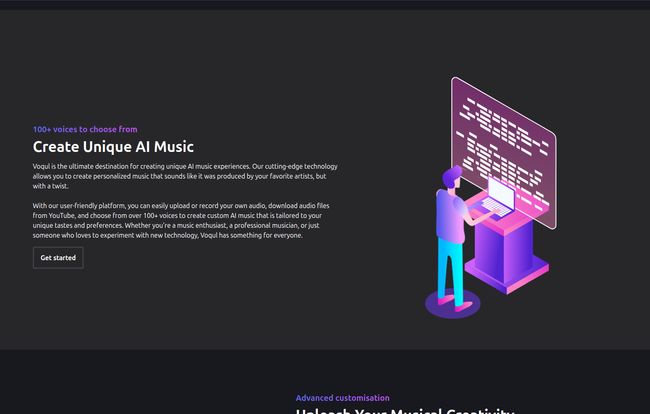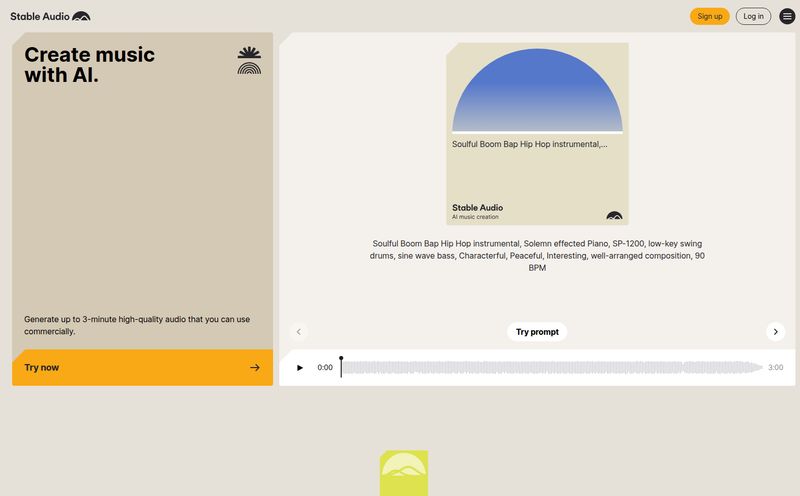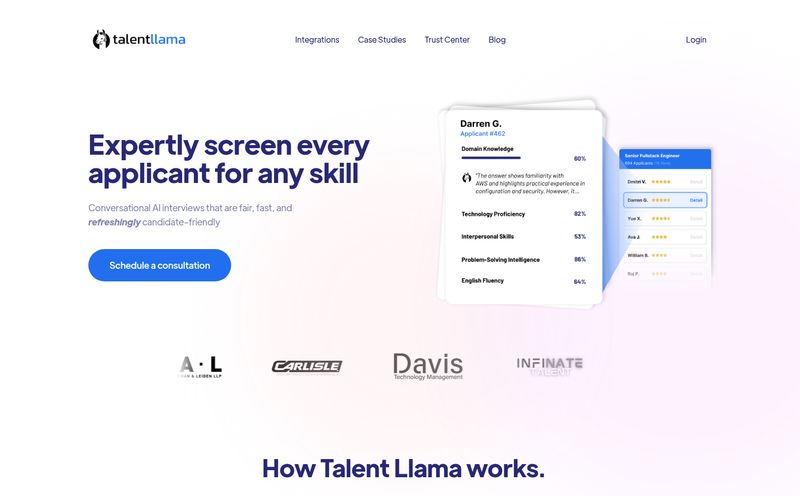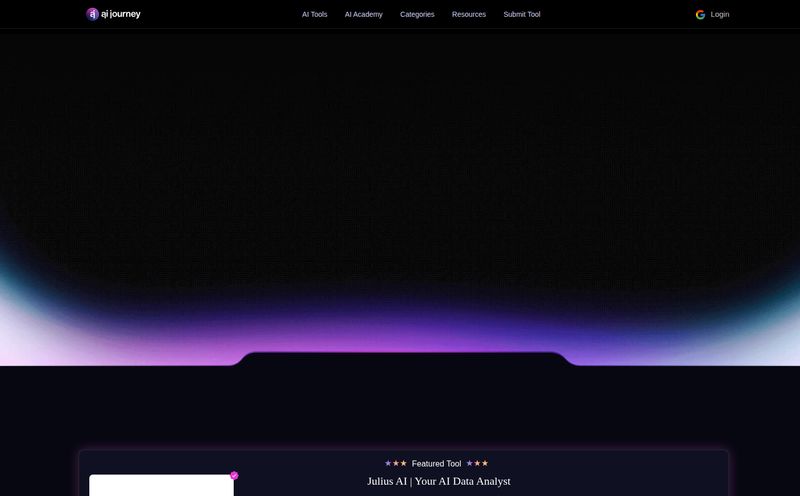It feels like every single morning I wake up to a new AI tool that promises to change my life, my workflow, or at the very least, my coffee-making routine. Most of them are… fine. A flash in the pan. But every so often, something pops up on my radar that makes me lean in a little closer. This week, that something was Voqul.
I’ve been in the SEO and digital content game for years, and I’ve seen trends come and go like seasons. The current AI music and audio wave isn’t just a trend, though; it feels more like a seismic shift. We’ve all seen those viral AI-generated song covers on TikTok and YouTube – you know, Frank Sinatra singing a cover of a Lizzo song or something equally absurd and brilliant. It’s fun, it’s chaotic, and it’s powered by tools exactly like Voqul. But the question is, is Voqul just another toy for making memes, or is there something more substantial under the hood for creators?
Let's find out.
So, What Exactly Is Voqul?
At its heart, Voqul is an AI-powered platform designed to transform audio. Plain and simple. You feed it an audio file—a song, a podcast snippet, even your own voice humming a tune—and it swaps out the original voice for a different one from its library. Think of it less like a simple pitch shifter and more like a set of digital vocal cords you can borrow. It's an audio costume shop, letting you try on different sonic identities.
The platform claims to use “advanced artificial intelligence” to analyze not just the vocals, but the underlying musical styles and genres. This is where it gets interesting for me. It suggests the tech is doing more than a surface-level swap. It's trying to understand the feel of the original performance and replicate it with the new voice. That’s a tall order, but if it works, the potential is huge.

Visit Voqul
How Voqul Reimagines Your Audio
The process itself seems refreshingly straightforward, which is a big plus in a world of overly complicated user interfaces. You don't need a degree in audio engineering to get started.
The Core AI Magic
From what I gather on their site, the process is built for simplicity. You can upload an audio file directly from your computer, record something on the spot, or—and this is a pretty neat feature—just paste in a YouTube link. The tool then gets to work, separating the vocal track and applying the new AI voice model you’ve selected. The promise of “advanced customisation” means the AI is supposedly smart enough to keep the original emotion and melody intact, just delivered in a new voice. A bold claim.
A Library of Over 150 Voices
The real playground here is the voice library. With over 150 voices (their homepage says 100+, other materials say 150+, I'm guessing they're adding new ones fast), you have a massive palette to paint with. I haven't seen a public list of who these voices are, which is probably a smart move to sidestep the whole murky legal world of voice cloning big-name artists. Instead of 'The Weeknd,' you'll likely find voices described by their characteristics: 'soulful male baritone,' 'upbeat pop female,' 'gritty rock vocalist,' and so on. This actually gives creators more room for originality, rather than just making cheap fakes.
Beyond a Gimmick: Who Is This Actually For?
Is this just for making your favorite streamer sing a sea shanty? Maybe. But I see a few professional use cases bubbling under the surface.
- The Musician & Producer: Got a song idea but you're not a confident singer? Create a high-quality demo with a voice that fits the genre. Experiment with different vocal styles on a track without hiring five different session singers. It’s a scratchpad for vocal ideas.
- The Podcaster & Content Creator: Imagine creating unique jingles, podcast intros, or funny social media skits with custom voices. You could develop recurring characters for a show or just add a layer of production value that was previously out of reach for smaller creators.
- The AI Hobbyist: Let’s be real, a huge part of the audience is people like you and me who just want to mess around. And that's perfectly valid! Experimentation is how the next big thing gets discovered. There’s no harm in just having some creative fun.
Let’s Talk Money: The Voqul Pricing Mystery
Alright, here's the part that gives me pause. As of my review, Voqul is playing its cards very close to the chest when it comes to pricing. There's no clear pricing page that I could find. The information I have suggests a credit-based system, where certain features or conversions will cost you credits. This is a common model for AI tools, but the lack of transparency is a bit of a red flag for me. I prefer to know what I’m getting into before I get my creative juices flowing.
My advice? Go in with your eyes open. Sign up, see if they offer any free starting credits, and test the waters before you commit any real money. Hopefully, they’ll make their pricing structure clearer as the platform matures.
Making Some Extra Cash with the Affiliate Program
One thing they are very clear about is their affiliate program. This is actually a pretty smart move for a new platform. They give you a unique referral link, and when someone signs up and makes a purchase (presumably of those credits we just talked about), you get a commission. It’s a classic growth-hacking strategy. It tells me they're confident that once people try Voqul, they'll want to share it. For content creators who review or use the tool, this could be a nice little side-earner.
My Final Verdict: Is Voqul a Hit or a Miss?
So, where do I land on Voqul? I'm cautiously optimistic. The core idea is fantastic and taps directly into the current creative zeitgeist. The ease of use, especially the YouTube link feature, lowers the barrier to entry significantly. The potential for musicians and content creators to use this as a genuine creative tool, not just a gimmick, is definitely there.
The biggest downside is the ambiguity around the pricing and credit system. I really hope they clarify this soon, because it’s the main thing holding me back from giving it a wholehearted recommendation. That, and the ever-present ethical questions surrounding AI-generated art, which is a whole other can of worms we need to keep talking about as an industry.
For now, I'd say Voqul is a fascinating tool that is absolutely worth a look, especially if you're a creator curious about the cutting edge of AI music. Just maybe hold onto your wallet until the pricing becomes a bit more transparent. It’s a powerful sandbox, and I for one am excited to see what people build in it.
Frequently Asked Questions about Voqul
- What exactly can I do with Voqul?
- You can take almost any audio file (a song, a podcast, a voice note) and change the voice to one of over 150 different AI-generated voices. It's great for creating AI song covers, unique podcast intros, or just experimenting with different vocal styles for your music projects.
- Can I use copyrighted songs with Voqul?
- This is a major grey area in AI right now. While the tool lets you use a YouTube link, you should be extremely careful about the output. Using it for personal, private experimentation is one thing. Publishing an AI cover of a copyrighted song for public or commercial use could land you in legal trouble. Always be mindful of copyright law.
- How much does Voqul cost?
- Currently, Voqul doesn't have a public pricing page. The platform appears to use a credit system, where you spend credits to generate audio. It’s best to sign up and see if they offer any trial credits to test the service before you commit to a purchase.
- Is Voqul difficult to use for beginners?
- Not at all. The interface is designed to be very user-friendly. If you can copy and paste a link or upload a file, you have all the technical skills you need to get started with Voqul.
- What makes Voqul different from other AI voice changers?
- Its main differentiators seem to be the large library of over 150 voices and its focus on musicality. The platform claims its AI analyzes the style and genre of the source audio to create a more natural-sounding and emotionally resonant output, rather than just a flat voice swap.
- Can I make money with Voqul?
- Directly, you can earn money through their affiliate program by referring new paying users to the platform. Indirectly, you could use the tool to create unique audio content for projects that you then monetize, like a YouTube channel or a podcast.



